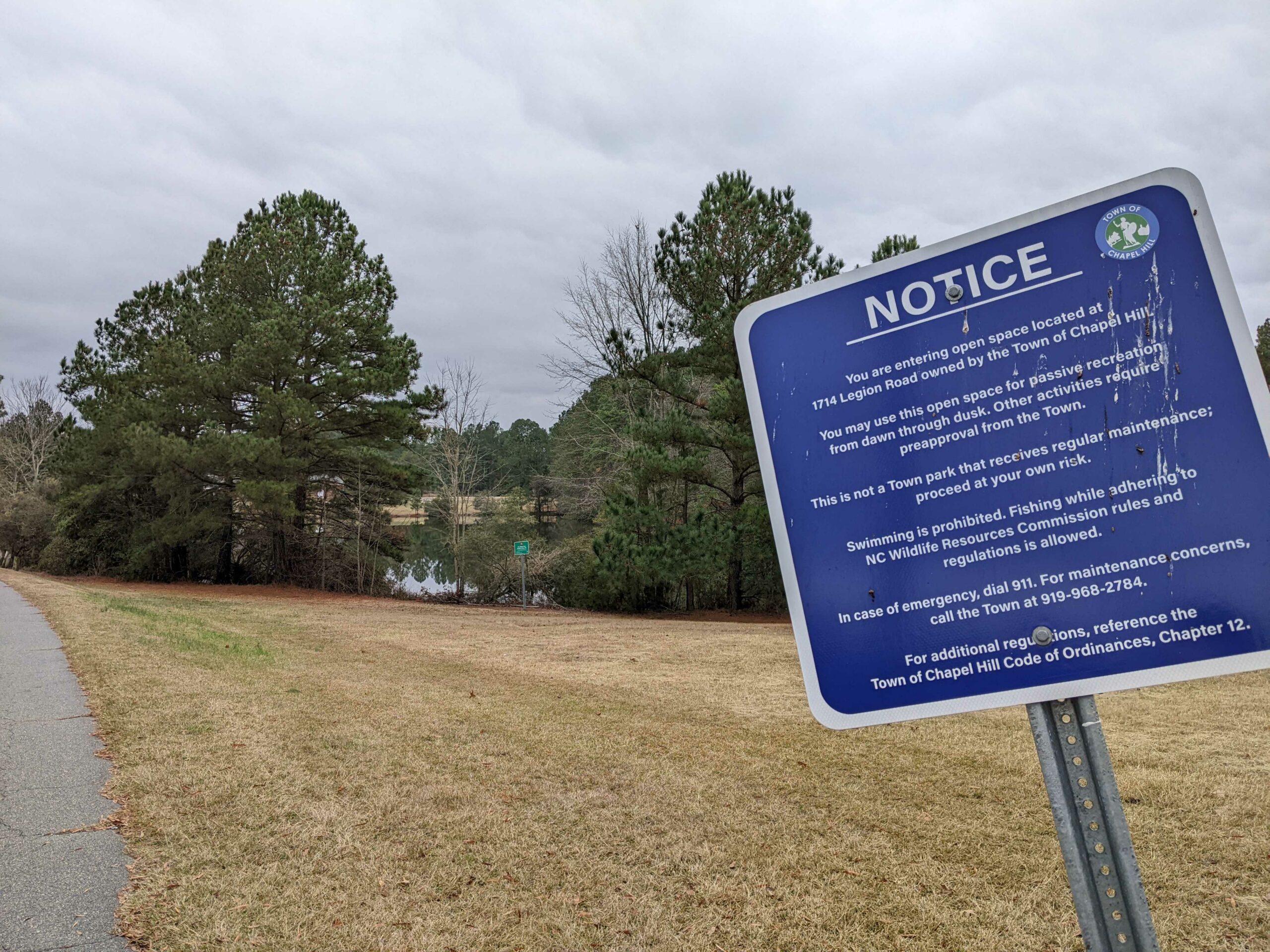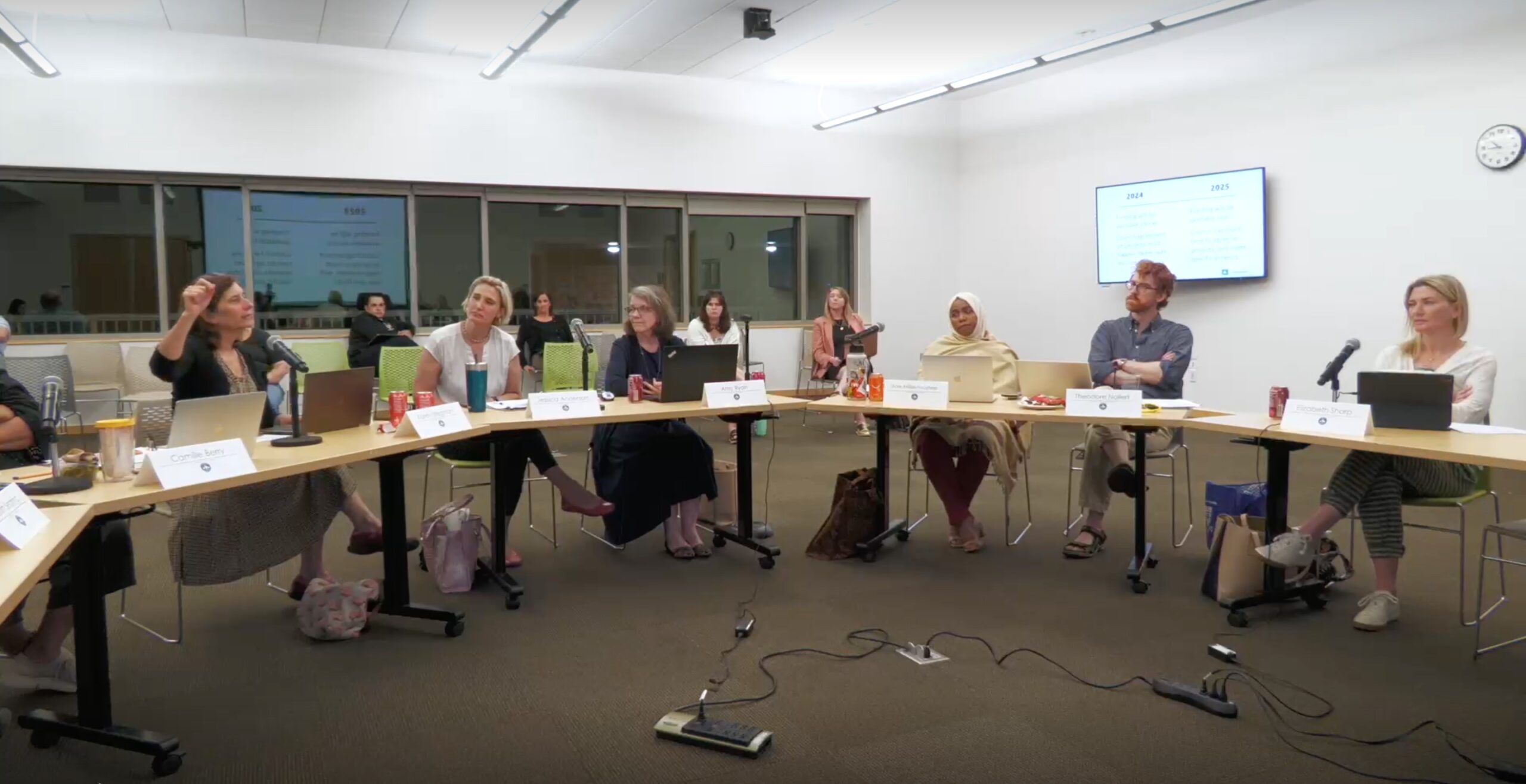The Chapel Hill Town Council held a work session at the Chapel Hill Public Library on February 14. The council had two items on its agenda: updates on affordable housing strategies and a continuation of discussions on capital needs projects. Below are highlights from each item.
Affordable Housing Strategies and Tools
Director of Affordable Housing and Community Engagement Sarah Viñas presented updates on affordable housing challenges, strategies, and tools. Viñas said one of the housing challenges facing Chapel Hill is a net increase of “just” one percent in the housing supply since 2010. She listed other challenges including a 36 percent increase in median home sale prices since 2010 and cost burdens faced by 78 percent of renter households. There has also been a 32 percent decrease in Black homeownership since 2010 caused by displacement pressures and an estimated gap of 1,900 rental units for renters earning an annual income under 50,000.
“In the context of this incredible challenge that we are attempting to address together with our partners,” said Viñas, “we find ourselves in a place of uncertainty in our affordable housing work. We have developed a really strong pipeline of projects, as we have talked to you all about before, that could be delivered over the next several years thanks to the increased support from the council over the last several years, and the dedication of our partners. Even so, our capacity is constrained right now due to inadequate funding and also staff capacity.”
Chapel Hill’s Affordable Housing and Community Connections Department is undergoing a structural change, merging with the Public Housing Department. Viñas said the goal of the merger is to enable the town to address all housing functions in one department. She distinguished the programs the town addresses into four main categories:
- Those that fund affordable housing projects
- Those that initiate development and preservation
- Those that address home ownership and housing management
- Those that rate and implement housing policies
Affordable Housing Manager Emily Holt presented some specific programs being implemented including an Affordable Housing Loan Fund, estimated to support more than 600 affordable housing units. She also discussed several projects nearing key development checkpoints.
“Looking at development on town land,” Holt said, “after a very very long planning period with many unanticipated delays over the last few years, we are really excited about breaking ground on three projects in 2024. These three projects together will total more than 200 affordable units, and they include Trinity Court, which we expect to break ground this spring, Tanyard Branch Trace, which should break ground by the end of the summer, and Homestead Gardens, by the end of the year.”
Holt also presented the town’s progress at the Longleaf Trace housing development project. Longleaf Trace is an affordable housing project led by Greenville-based Taft-Mills Group. As the town’s Low Income Housing Tax Credit (LIHTC) applicant, Longleaf Trace, the 50-unit proposal for development off Legion Road, is eligible for “expedited review.” Using expedited review, the town council can take action on a rezoning hearing during the same meeting as a public hearing to save as much as a month of the development process. The council is scheduled to consider the project’s rezoning application with expedited review in 2024. Due to the size of Chapel Hill, it can qualify for one LIHTC project per fiscal year.
Council Member Paris Miller-Foushee asked for clarification about what factors go into a project qualifying for LIHTC. After Holt listed proximity to grocery stores, public transit, and other key amenities, Miller-Foushee tied the council’s discussion of LIHTC projects to a broader initiative at the national level. Miller-Foushee said increasing the number of LIHTC projects that jurisdictions can qualify for and increasing the average median income (AMI) of qualifying areas from 30 to 50 percent could be beneficial for Chapel Hill’s affordable housing goals.
“Hopefully we can be reaching out to our Congresswoman [Rep. Valerie] Foushee to support these types of reforms that can have some real impact locally for us,” said Miller-Foushee.
Viñas addressed Miller-Foushee’s comments on the town’s challenges in securing LIHTC projects.
“One of our key limitations as a county,” said Viñas “is that we typically can only get one LIHTC per year, which is a huge limitation. So, if you look at some of our neighboring jurisdictions, they’re getting several LIHTCs a year, and we’re not able to do that. So that’s one key piece that if that could be changed, that would be very helpful in addition to more resources overall.”
After some disagreement between Council Member Elizabeth Sharp, Council Member Theodore Nollert, and other members regarding the role that master leasing can have in Chapel Hill’s affordable housing strategy, Council Member Camille Berry suggested the council undergo training on the different tools the council has to address housing.
Sharp also voiced her opinion that it is important to diversify the location of affordable housing developments so they are not too dense.
“I would love it if as we are thinking about densifying existing neighborhoods,” said Sharp, “that we are also thinking about affordability in that situation, and that as we are thinking about building affordable housing, we are thinking about how to add it to already established neighborhoods.”
As she addressed the town’s staff, Mayor Jessica Anderson acknowledged the challenge of integrating affordable homes into existing communities but said the town’s priority is providing housing.
“If it’s going to be in a single apartment building within Chapel Hill,” said Anderson, “what we hear from people time and time again is they would rather live in a not-as-integrated building so that they can live here. So I think given the size of the crisis that we’re doing a lot of different things.”
“I do think we can remember that both things can be true,” continued Anderson. “We can really want to have folks in our neighborhoods, and we also have to remember that the need is so big that it’s not always going to be our idyllic version of what the integration would look like. But it also means that people are living here who work here and have family here.
More information about Chapel Hill’s affordable housing projects can be found here.
Capital projects
The town council continued its conversation from their annual retreat about capital projects that will appear in the 2025 bond referendum.
“This is really intended to be the beginning of the conversation,” said Town Manager Chris Blue. “We did have a good conversation at the council retreat earlier this month where we kicked off conversations about the budget and debt, and tonight is really a continuation of that conversation.”
Business Management Director Amy Oland explained the two types of bonds the council has at its disposal to address capital projects: general obligation bonds and limited obligation bonds. The primary difference between the two types of bonds is general bonds require a referendum while limited obligation bonds do not. Thus, Oland said that general obligation bonds are preferable and are used for popular projects the community will likely vote to pass.
Though the council did not discuss any particular capital projects during the meeting, Oland listed the measures the town uses when evaluating potential projects. The measures are a project’s alignment with established goals including Complete Community, racial equity, shovel-readiness, staff capacity, and alternative funding sources.
Staff presented the council with two hypothetical approaches for allocating $50 million the town has access to via a debt affordability approach. The approaches differed in their allocations of funding toward streets and sidewalks, public facilities, public safety facilities, recreation facilities, affordable housing, remediation of facilities, and open space and greenways.
Council Member Nollert said he would like impact and urgency to be components the staff addresses when presenting to the council, because otherwise the allocation of resources, even if on a high level, does not help the council understand which issues need to be addressed.
“There’s quite a lot, as I think anyone would be quick to point out,” said Nollert, “that I as a new person do not know or understand or have context for about how the town works, and I need your help to tell me why you think things are really urgent. Then I might have an intuition, or maybe I’d have a different opinion about it. But I really need that guidance, and that was missing from this presentation.”
Most council members said they agreed with Nollert’s point about staff including impact and urgency as lenses to evaluate future projects, including Council Members Sharp, Miller-Foushee, Berry, Karen Stegman, Melissa McCullough, Amy Ryan, and Mayor Anderson.
Council Member McCullough said she would like to see the staff add consideration of a resilience lens for all capital projects considered by the council.
“There are real resilience issues that are going to be survival issues,” said McCullough, “and we need to be able to have the green cover to try to help us with our urban heat islands because that has to do with survival issues. There are so many things that we need to be prepared for, and that we need to plan for, and that we need to start thinking about now so that we don’t head down on a path that may seem easy now, but will not let us get to where we need to go.”
Though no formal actions were taken at the meeting, Mayor Anderson instructed the town’s staff to include impact, urgency, and resilience as lenses the staff should consider when approaching the council with recommendations.
To watch the full meeting from February 14, click here.
Photo via the Town of Chapel Hill.
Chapelboro.com does not charge subscription fees, and you can directly support our efforts in local journalism here. Want more of what you see on Chapelboro? Let us bring free local news and community information to you by signing up for our newsletter.








